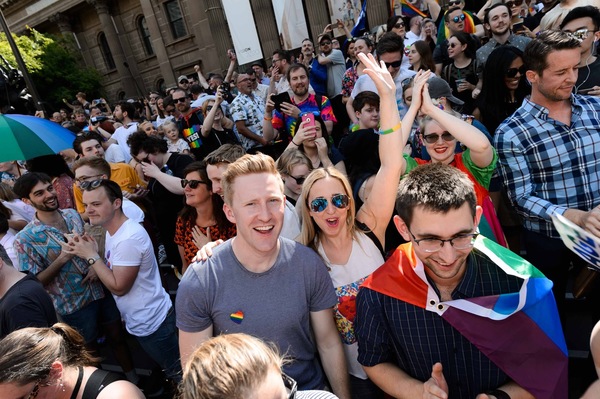
By Kath Gannaway
Jason Ball is celebrating a major step forward in achieving equality for LGBTI people.
The 2017 Victorian Young Australian of the Year came out in 2012 as a gay, 24-year-old player for Yarra Glen Football Netball Club.
“We have to celebrate the win as a community, and put our arms around each other because we have been through some tough times,” he said, following the announcement on Wednesday 15 November that 61 per cent of Australians voted to legalise same-sex marriage.
But, he admits his reaction was mixed.
“When I was waiting for the result, I felt sick in the stomach,” he said.
“It was the same feeling I had when I was young and coming out. That feeling of worrying about what friends would think of me except this time it’s the whole country passing judgement on me and my relationship.”
He said the result with 12,720,920, or 79 per cent of eligible Australians, voting in a voluntary survey and 61.6 per cent of those people voting ‘Yes’, confirmed what was already know, that over 60 per cent of Australia supported same-sex marriage.
While it has been described as a ‘resounding’ endorsement, the reality is that Jason, and others in the LGBTI community, still have to deal with a not insignificant ‘No’.
“To know that 38 per cent still voted ‘No’ is still hard to hear for many of us,” Jason said.
“We don’t know their reasons, but we think a large number were hoodwinked by the No campaign trying to conflate things like sex education and freedom of speech, things that have nothing to do with marriage.
“While we can celebrate that the pathway has been cleared for marriage equality, we still have to keep looking after each other, particularly in areas where the No vote was high.”
Seventeen electorates voted ‘No’ and the top 10 were in areas with a high multicultural population, or a high proportion of newly arrived communities.
“Laws don’t necessarily change everything,” he said. “Change is hard and not everyone is going to be with us, and especially among newly arrived communities who are still adjusting to Australia and our way of life and values.”
There was one demographic however whose participation alone gives hope according to Jason.
The youngest eligible Australians, 18 and 19 year olds, responded strongly with around 78 per cent going old-school, literally ticking a box and posting the survey form.
“That gives hope and really breaks the stereotype that young people don’t care about issues and politics.
“If you have that many participating in a non-binding postal survey, that’s incredible,” he said.
“It means young people will vote on issues they are passionate about and I think both Liberal and Labor should be worried when they looking at issues such as Adani, climate change and asylum seekers.”
Jason said he felt proud to be part of the LGBTI community through what he described as a gruelling campaign that no-one wanted.
“I felt proud of them for showing resilience in the face of the ‘No’ campaign and proud of the ‘Yes’ campaign for staying positive and sticking to the facts.
“And, I’m proud of the 61 per cent of Australians who supported same-sex marriage by treating people equally.”
The Prime Minister’s outspoken support of the outcome, now that the vote has been taken, doesn’t impress however.
“It’s too little, too late,” Jason said. I’m not proud of Malcolm Turnbull and I’m not proud of the government,” he said.
“I don’t think the high turnout can be seen as validation of the process.
“If we do achieve marriage equality, it will be down to the grass-roots campaign in a process we should never have had to face.
“We never wanted this survey; it was forced on us, but the one thing we can hold on to is that 61 per cent majority.
Marriage plans?
“I’ve always wanted to live in a country where I was able to make that choice,” he says, adding that he is looking forward to the wedding next year of friends Michael and Shaun … “and many more to come if legislation is passed”.
On the legislation which he predicts will be debated in the lower house in the week of 27 November, he is adamant there should be no giving in to watering down of the Bill by introducing new religious exemptions or other compromises.
“We want full equality … no compromise on equality.”






